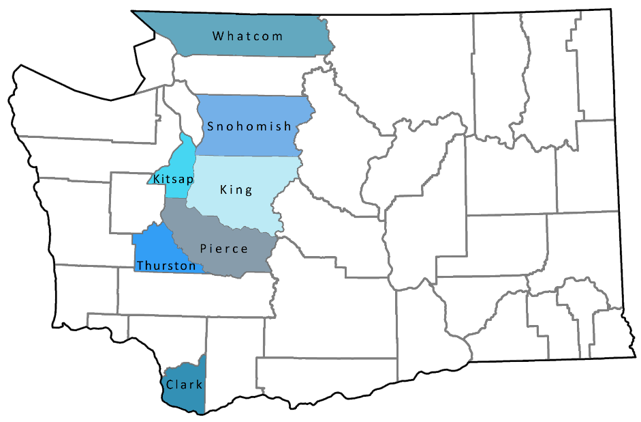The Local Project Review Act was established in 1995 as the statewide framework for local government land use planning review and development permitting. Fundamental land use planning choices made in adopted comprehensive plans and development regulations serve as the foundation for project review.
New requirements in 2023
Major changes were made to the Local Project Review Act with Chapter 338, Laws of 2023 (SB 5290) (PDF). Updates and amendments to the act are intended to consolidate, streamline and further improve local permit review processes for improved outcomes for applicants, customers, planners, builders and designers. Amendments went into effect in the summer of 2023, except for new permit time period requirements which will go into effect on January 1, 2025 (RCW 36.70B.080).
- Fact Sheet on Chapter 338, Laws of 2023 (SB 5290) – Key Requirements (PDF)
- FAQ on Chapter 338, Laws of 2023 (SB 5290)
- FAQ webinar presentation (PPT)
- FAQ webinar video recording (Vimeo)
- MRSC – Local Project Review
Local jurisdictions are responsible for implementing several new requirements.
- RCW 36.70B.070
- Clarify determination of completeness procedural requirements.
- The determination must be based on the procedural requirements as outlined on the project permit application.
- RCW 36.70B.080
- Apply new default timelines for processing permits, effective January 1, 2025.
- 65 days if no notice is required for the permit type
- 100 days if public notice is required for the permit type
- 170 days if public notice and hearings are required for the permit type
- Refund application review fees up to 20% if new time periods are not met, unless additional measures have been adopted.
- Report annual permit review data, including data on compliance with the new permit time periods – only for counties and cities subject to the requirements of the Review and Evaluation Program, RCW 36.70A.215 (often referred to the Buildable Lands Program) and cities greater than 20,000 population within those counties.
- Apply new default timelines for processing permits, effective January 1, 2025.
- RCW 36.70B.160
- Adopt some of 10 listed measures to expedite permit review by the next comprehensive plan update, under certain circumstances.
- Adopt additional measures to expedite permit review if the local government had adopted at least three project review and code measures more than five years earlier, and the local government is not meeting the permit deadlines at least 50% of the time since its most recent comprehensive plan update.
Resources
Responding to Chapter 338, Laws of 2023 (SB 5290), Commerce in 2024 launched two grant programs to assist cities and counties for actions related to streamlining residential building permit review and modernizing permitting processes. Grants totaling $3 million were awarded in September 2024, expending the available funding.
Consolidated Permit Review grants provided funding to cities and counties that committed to issuing a final decision on permit applications within 45 business days or 90 calendar days.
Paper to Digital grants assisted cities and counties in transitioning from paper filing systems to digital systems capable of processing permit applications.
Additional rounds of these grant programs may become available if additional funding is allocated by the Legislature.
Commerce was tasked with facilitating a study to examine the benefits and drawbacks of implementing a statewide permit process system and tracking software capable of virtual inspections, electronic review and with capacity for video storage. Specifically, the study will address the following:
- Evaluate existing needs for digital permitting systems, including impacts on existing digital permitting systems already in place.
- Review barriers preventing local jurisdictions from accessing or adopting digital permitting systems.
- Evaluate the benefits and costs associated with a statewide permitting software system.
- Provide budgetary, administrative policy and legislative recommendations to increase the adoption of or establish a statewide system of digital permit review.
Commerce formed a digital permitting work group to recommend an approach for modernizing local government permit systems supported by extensive fact finding and barrier identification. The digital permitting work group is made up of a wide array of stakeholders including planning directors, administrators, building officials, state and local government organizations and information technology professionals.
A final report to the Legislature will be released in the fall of 2024.
Commerce provides technical assistance and guidance to counties and cities to ensure permit review fees are reasonable and sufficient to recover true costs associated with permit review. Guidance includes the different ways permit fees are established, the methodology for establishing fee structures, and instruction on tracking and analysis jurisdictions can do based on an understanding of the time it takes to review a permit and the true costs to the jurisdiction for that respective review (RCW 36.70B.245).
Please refer to Navigating Permit Fees: Guidance on Cost Recovery (PDF) for the latest guidance.
Counties subject to the Review and Evaluation Program (often referred to as the Buildable Lands Program), RCW 36.70A.215, and cities within those counties with a population over 20,000, must publish an annual report with data on permit volumes and timelines. Annual permit data must be sent to Commerce and posted annually to increase public accessibility of permit data. Counties required to produce an annual report include Clark, King, Kitsap, Pierce, Snohomish, Thurston and Whatcom (RCW 36.70B.080).
Commerce will develop an annual performance report template that local governments will use to document and report permitting data for each year. Guidance for using the template and tracking information to meet the requirements will accompany the report template.

In 2023, the Legislature directed Commerce to develop a plan for communities to secure technical support staff needed to review residential housing permits so that they may meet permit review timelines.
A resource list of trained staff that can provide temporary support for timely processing of residential housing permit applications will be made available on the Local Project Review webpage soon.

